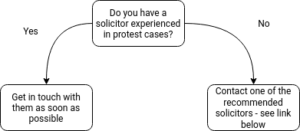1. Legal Representation and Self Representation
Legal representation is the first thing to consider after being charged with an offence.
Find a solicitor experienced in protest cases.
1. Legal Costs and Legal Aid
Having a solicitor represent you costs money. If you cannot afford the cost of legal representation, the state may pay part or all of your fees via a scheme known as ‘Legal Aid’. Whether you qualify for legal aid or not depends on your financial circumstances and and the seriousness and complexity of your case. Sadly, due to cuts, much fewer people now qualify. However: if your case is a serious one and/or you are unemployed or or on a low income, there is a good chance you will receive some form of state support with legal costs if you are prosecuted.
Solicitors sometimes agree to represent people who don’t qualify for legal aid, because one or more of their co-defendants does, allowing people to effectively ‘piggyback’ on the aid other people receive. If you do not qualify and are being tried as part of a group involving others who do, it is worth asking your solicitor about whether this is a possibility (assuming you have the same one). If you wish to find out if you qualify for legal aid you should contact one of our recommended solicitors.
More information on eligibility is available on the Citizens’ Advice Bureau website.
| Solicitors bills and fines are not the only costs you might face if you are prosecuted – travelling to and from court can be a costly business, particularly if the court is at the other end of the country |
2. Representing Yourself
If you cannot afford or do not want to be represented by a solicitor, you will need to represent yourself in court. If you are doing this for the first time, we strongly recommend you get in contact with us (07946 541 511) or with Activist Court Aid Brigade , as we can help support you through this process. ‘How to Defend Yourself in Court’ by Michael Randle, is a detailed guide to defending yourself – produced by the Civil Liberties Trust and annotated by LDMG. Defendants who represent themselves in court can – at the discretion of the judge – have someone stood with them during proceedings called a McKenzie friend. If you would like someone to act as a McKenzie Friend during your court appearances, please contact the Activist Court Aid Brigade.
3. Putting in the Legwork
1) Keep in contact with them.

